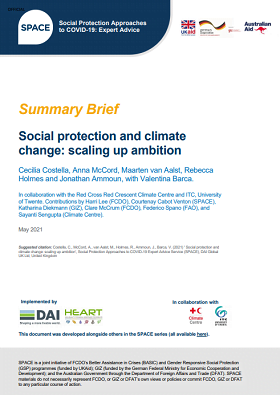SPACE Social protection and climate change: scaling up ambition (Summary Brief)
Climate change, once perceived as a long-term environmental issue, is now an immediate threat to safety and prosperity, especially for the most vulnerable people that are hit hardest by increasing weather extremes. The impacts cannot be managed just by reducing greenhouse gas emissions or by small tweaks and adaptations to our investments. We also have to manage the reality of social and economic impacts – of climate change, but also of climate change mitigation measures – right now, especially given that these impacts often degrade future resilience, resulting in a downward spiral of climate impacts and rising vulnerability. The unprecedented increases in global poverty in 2020 as a result of COVID-19 exemplify the multidimensional impacts that a global and complex risk can create. Even before the pandemic, climate change threatened to push over 130 million more people into poverty in the next decade alone (Hallegatte, 2016). While we cannot perfectly predict risks, it is essential to have risk management systems in place to save livelihoods, property, and lives.
The COVID-19 crisis has brought to the forefront the importance of protecting people in times of shocks through large, established risk management tools such as national social protection systems. Social protection is a key policy instrument to manage social risks, which are those arising from life cycle and income risks (old age, job loss, etc.). To respond to the socio-economic impacts of the COVID-19 crisis, over 200 countries and territories invested over $800 billion in more than 1,400 social protection measures in 2020 alone (Gentilini, 2021). Similarly, social protection can play a central role in managing climate risks by addressing chronic poverty, providing temporary support during periods of acute economic and livelihood disruption, and ultimately building resilience preparing people better for shocks.



